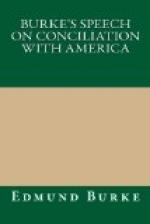Sir, I can perceive by their manner that some gentlemen object to the latitude of this description, because in the Southern Colonies the Church of England forms a large body, and has a regular establishment. It is certainly true. There is, however, a circumstance attending these Colonies which, in my opinion, fully counterbalances this difference, and makes the spirit of liberty still more high and haughty than in those to the northward. It is that in Virginia and the Carolinas they have a vast multitude of slaves. Where this is the case in any part of the world, those who are free are by far the most proud and jealous of their freedom. Freedom is to them [Footnote: 25] not only an enjoyment, but a kind of rank and privilege. Not seeing there, that freedom, as in countries where it is a common blessing and as broad and general as the air, may be united with much abject toil, with great misery, with all the exterior of servitude; liberty looks, amongst them, like something that is more noble and liberal. I do not mean, Sir, to commend the superior morality of this sentiment, which has at least as much pride as virtue in it; but I cannot alter the nature of man. The fact is so; and these people of the Southern Colonies are much more strongly, and with an higher and more stubborn spirit, attached to liberty than those to the northward. Such were all the ancient commonwealths; such were our Gothic ancestors; such in our days were the Poles; and such will be all masters of slaves, who are not slaves themselves. In such a people the haughtiness of domination combines with the spirit of freedom, fortifies it, and renders it invincible.




